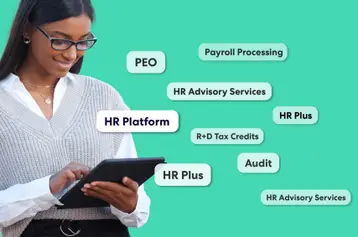8 Ways That Bundling HR and Benefits Administration Outsourcing Can Help an SMB

Table of contents
- 1.Understanding HR and Benefits Administration Outsourcing
- 2.Weighing Your Options
- 3.What are the benefits of keeping things in-house?
- 4.Why go with HR and benefit administration outsourcing over an HRIS?
- 5.Consultants and specialty services
- 6.PEO
- 7.ASO
- 8.8 Key Advantages of Outsourcing for Small Businesses
- 9.Cost efficiency
- 10.Effective hiring processes
- 11.Administrative efficiency and reduced paperwork
- 12.Direct vendor contact for workforce support
- 13.Consistent data across HR and benefits functions
- 14.Compliance support with less stress
- 15.Provide enhanced employee experience
- 16.Bring your systems into the tech age
- 17.Your Solution for HR and Benefits Administration Outsourcing
If you're looking to optimize your budget while still supporting important functions like HR and benefits administration, you need an easy and cost-effective solution.
In this article, we'll focus on how bundling HR and benefits administration outsourcing can streamline business operations, reduce administrative burden and optimize cost efficiency. Let's take a closer look at this outsourcing strategy, which has helped so many small businesses.
Understanding HR and Benefits Administration Outsourcing
Outsourcing HR and benefits functions has become a popular strategy among small businesses that want to streamline operations and reduce administrative burdens. This trend reflects a shift toward leveraging external expertise to help handle complex HR functions. Small businesses need help with payroll processing, benefits administration, compliance and other tasks.
Specialized providers can give businesses access to advanced technology. Outsourcing can help SMBs navigate compliance and get access to competitive benefit packages that might otherwise be out of reach. This can boost efficiency and help owners to focus more on growth and strategy, rather than administrative tasks.
Weighing Your Options
Before we take a deep dive into the world of HR and benefits administration outsourcing, we should zoom out and take a more holistic approach. You have a lot of options!
What are the benefits of keeping things in-house?
Some small businesses choose to handle HR in-house. They spread HR responsibilities across a few leaders or hire a dedicated HR staff member or two. This setup offers a high level of control and a personal touch. Your team knows the business culture, employees and unique needs firsthand.
Often, the higher-ups may manage HR tasks alongside their primary responsibilities. This can become overwhelming as the team grows or regulations become more complex.
In-house HR gives you flexibility and familiarity. It may not, however, provide the expertise or tools to keep up with fast-changing employment-related rules and requirements and employee expectations. Some businesses decide to work with an insurance broker to manage benefits. Brokers can help guide you on choosing plans and handling renewals, but they usually focus on the insurance side of things. They might not help with administrative tasks, employee training, or policy review.
Why go with HR and benefit administration outsourcing over an HRIS?
Another option small businesses explore is using an HRIS, Human Resources Information System. These are software platforms designed to streamline and automate HR tasks like:
- Tracking work hours and time off
- Storing employee records
- Running payroll
- Administering benefits
Some HRIS systems handle certain specific tasks. You would then need to coordinate with other tools or providers, such as separate payroll processors or insurance brokers. Others are more integrated. They bring HR, payroll and benefits together under one digital roof.
While HRIS platforms can save time and reduce paperwork, they’re tools—not comprehensive solutions. Someone on your team will have to manage the system, make decisions and handle employee questions.
Consultants and specialty services
Some small businesses take an a la carte approach to HR by working with consultants and specialty service providers. This means bringing in outside experts for specific needs, such as:
- Hiring a consultant to create an employee handbook
- Outsourcing payroll to a payroll service
- Hiring a lawyer for help with compliance issues
- Hiring an accountant for tax matters
This approach enables businesses to pay for only what they need, when they need it.
Payroll outsourcing is one of the most common examples. These providers help handle time-consuming tasks like processing paychecks, remitting payroll taxes and generating reports.
This model can leave gaps between services, which might place demands on the business owner or internal team. It’s a helpful option for businesses that want expert input without fully outsourcing HR.
PEO
A Professional Employer Organization (PEO) offers one of the most comprehensive ways for small businesses to administer their HR and employee benefits. By entering a co-employment relationship, the PEO generally becomes the employer of record for payroll tax purposes. The client business retains full control over day-to-day operations and employee and business decisions. This setup gives your business access to big-company benefits—like health insurance and retirement plans—at a more cost-effective cost than you'd likely get on your own.
Working with a PEO also means gaining access to HR, payroll and compliance experts. A PEO helps with the heavy administrative load that is on your plate. You have less to worry about regarding onboarding, employee relations, risk mitigation and evolving employment-related rules and requirements. You can focus on growth while giving employees a professional, well-supported workplace experience. A PEO is great for scalability, too. It can grow right alongside your business.
ASO
An administrative services organization (ASO) offers a structured approach to HR outsourcing without the co-employment model of a PEO. Your business retains all employer responsibilities, but you gain access to HR support. Services typically include support with payroll processing, benefits administration, HR compliance and risk mitigation. You can choose various service level options. Small businesses can receive support with administrative tasks while maintaining full control over their workforce and decisions.
ASOs can provide HR expertise, tools and services that might otherwise be out of reach for small teams. However, unlike a PEO, they don’t provide access to employee benefits or payroll tax filings under their own tax ID. Those responsibilities stay with your business. ASOs work well for companies that want HR support and systems without the ties of a co-employment relationship.
8 Key Advantages of Outsourcing for Small Businesses
Now, let's look at the advantages of outsourcing benefits administration as well as other HR functions.
Cost efficiency
According to NAPEO, The annual return on investment (ROI), just from potential cost savings alone, from using a PEO averages 27%. Bundling services like payroll, benefits administration and compliance gives you access to tools and expertise that would be expensive to manage separately. It’s a great way to take advantage of economies of scale without stretching your budget. Plus, you can often skip costly investments in HR software since many providers include those systems as part of the deal.
Even better, outsourcing frees up your time. Instead of spending hours handling paperwork or figuring out the latest compliance rules, you and your team can focus on running and growing the business. It’s not just about costs. It’s about using your resources more strategically and getting more done with less hassle.
Effective hiring processes
Outsourcing HR and access to benefits can help your business compete for top talent. A PEO can give you access to competitive benefit packages—often similar to what large companies can offer. This includes competitive health insurance, retirement plans and other perks that candidates increasingly expect. Offering a strong benefits package helps you attract skilled professionals. It also shows that your business is stable, supportive and invested in its people.
In today’s job market, candidates have choices—and benefits often tip the scales. Outsourcing can help you simplify the hiring process. It provides tools for recruiting, onboarding and compliance support. You can also mitigate the risk of costly mistakes and create a smoother, more professional experience from day one. Your small business gains a stronger edge in attracting and keeping the right people.
Administrative efficiency and reduced paperwork
Outsourcing simplifies daily operations that often drain time and resources from a small business. Outside experts can use centralized systems to help with payroll processing, benefits enrollment, compliance reporting and employee recordkeeping. This can help dramatically reduce manual paperwork and administrative headaches. The boost in efficiency allows your internal team to focus on higher-impact work. Meanwhile, you and your staff address important matters. You make your deadlines. Regulations are followed. Employee needs are met.
Direct vendor contact for workforce support
When you outsource HR, especially with a PEO, you gain one direct vendor contact for your workforce support. This approach reduces the need to coordinate across multiple vendors or systems. You don't have to chase down answers. Employees don't need seven different logins and passwords for all your HR tools. You all have one centralized resource for questions, updates and guidance.
Consistent data across HR and benefits functions
Outsourcing HR can unify key functions into one integrated system and enhance prove your data. This can help reduce the risk of data discrepancies, duplicate entries and administrative errors that often happen when using separate tools or providers. With the workforce information stored and updated in one place, it’s easier to maintain consistency.
Compliance support with less stress
Compliance is one of the most complex and high-stakes areas of HR. Outsourcing to get expertise can help provide a major peace of mind for small businesses. Working with a trusted HR provider means gaining best practice guidance on employment-related laws, mandates like the FMLA and Affordable Care Act, and industry-specific or state-level requirements. A coordinated approach helps you navigate and keep your HR policies, benefits compliance and employee relations aligned and up to date. You can potentially also mitigate risk of noncompliance and the costly consequences that can follow.
We're living in an age of globalization. Many businesses operate across multiple states or jurisdictions. An outsourced provider can help you navigate the rules on things like paid leave, payroll taxes and employee classification. Outsourcing also could simplify review preparation and response. Your provider may have experience in keeping detailed records and offering professional support when questions or reviews arise.
Provide enhanced employee experience
Outsourcing can make the employee experience smoother, more professional and easier to navigate. From day one, employees benefit from a consistent onboarding process that flows directly into benefits enrollment. You can help reduce confusion and set the tone for a positive workplace relationship. Instead of facing scattered paperwork and vague instructions, new hires can glide through a consistent, well-organized process. They'll feel more supported and confident from the start.
An outsourced provider can also give employees access to a centralized portal. At their convenience, they can view pay stubs, manage benefits, request time off and update employee information. They won't need to go through HR every time. Self-service tools can save time by giving employees access to the information they need, when they need it. The result is a more engaged and satisfied workforce, with fewer administrative headaches for your internal team.
Bring your systems into the tech age
Modern technology integration can simplify how you manage your workforce. With a single system for employee data, you can reduce the need for duplicate data entry across different tools or platforms.
Integrated platforms also offer enhanced reporting capabilities. From one dashboard, you can see key metrics like headcount, benefits information and payroll costs. Many systems include mobile access, which is a major advantage for today’s increasingly remote and on-the-go workforce. Employees can easily check their pay stubs, enroll in benefits, or request time off right from their phones. The experience is more flexible and user friendly for everyone involved.
Your Solution for HR and Benefits Administration Outsourcing
Outsourcing HR and benefits administration doesn’t just solve administrative headaches. It can be a powerful growth strategy for small businesses. With TriNet, you get a full-service HR solution designed to meet the needs of growing companies.
TriNet’s PEO model offers access to premium benefits typically available o large employers. You'll also find user-friendly technology and personalized support. Are you looking to boost hiring, mitigate risk, or simply get more time back in your day? TriNet could help you build a stronger, more efficient workplace. And great things happen when you're able to focus on your bottom line.
Get your free Must-Have Health Insurance and Benefits Readiness Checklist and talk to an expert about your options for outsourcing HR and benefits today.

TriNet Team
Table of contents
- 1.Understanding HR and Benefits Administration Outsourcing
- 2.Weighing Your Options
- 3.What are the benefits of keeping things in-house?
- 4.Why go with HR and benefit administration outsourcing over an HRIS?
- 5.Consultants and specialty services
- 6.PEO
- 7.ASO
- 8.8 Key Advantages of Outsourcing for Small Businesses
- 9.Cost efficiency
- 10.Effective hiring processes
- 11.Administrative efficiency and reduced paperwork
- 12.Direct vendor contact for workforce support
- 13.Consistent data across HR and benefits functions
- 14.Compliance support with less stress
- 15.Provide enhanced employee experience
- 16.Bring your systems into the tech age
- 17.Your Solution for HR and Benefits Administration Outsourcing






